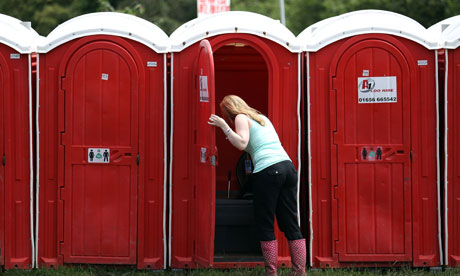Glastonbury festival has vetoed the first major attempt to test the use of legal highs and illicit drugs at a British festival by sampling sewage.
The exercise to be carried by analytical toxicologists had the backing of the police and involved the use of the emerging science of "wastewater analysis", which can detect even very low concentrations of illicit drugs in liquids.
Dr John Ramsey of St George's medical school, University of London, who has spent months planning the project, said he was disappointed by the decision.
"It would have been a golden opportunity to test the technology and find out the actual levels of the use of 'legal highs' and new psychoactive compounds," he said.
He said that Glastonbury, with its ethos that "British law applies, but the rules of society are a little bit different, a little bit freer" provided the ideal demographic.
Festival's founder Michael Eavis said in a statement: "The drug culture these days has changed beyond belief. What a cheek to even suggest there's a problem."
More than 100,000 revellers had passed through the gates of the 900-acre site, by near the Somerset village of Pilton, by midday on Thursday.
They arrived, as usual, dragging tents, sleeping bags, flags and crates of food through mud.
Almost a fortnight of intermittent rain has turned most of the fields into a blanket of sludge, and tractors have already begun distributing emergency bails of straw to absorb the water.
This year, though, Glastonbury has the weather forecasters on its side; while some rain is predicted for Friday, most of the weekend should be warm and dry.
Protesters have revealed that U2's set will be interrupted by an "unmissable" protest against its alleged "tax dodge". The direct action group Art Uncut is plotting a "visual spectacular" during the band's show on the Pyramid stage, which is believed to involve a giant inflatable.
In total 150,000 will stomp through Worthy Farm during the three-day festival to watch headliners including U2, Coldplay and Beyoncé.
When nature calls, they will be forced to use one of the notorious 4,600 portable toilets – some no more than metal boxes with a single open tank.
All the festival sewage gets tipped into a huge container and then fed out slowly into the local sewage works over the next few weeks. This gives the toxicologists the opportunity to sample the "wastewater" without having to tackle the problem of sampling the output of thousands of onsite portable toilets. It also ensures the process is totally anonymous.
"We can only do it if there is a central sewage system," said Ramsey, who carried out a similar project at a festival in Antwerp. "The joy of Glastonbury is that they have their own plumbing."
He said that with the government poised to introduce a new "temporary banning system" to counter new legal highs, it was important to establish what people were actually using.
Ramsey, whose company Tictac's database provides the police and others with a visual identification of drugs and new substances, said "wastewater analysis" was becoming established across Europe.
The monitoring exercise can only be done if there was a large number of people and they could only identify drugs that appear in urine in the first place and remain stable in sewage. Among the candidates that qualify are mephedrone, ketamine, BZP and mCPP.
Avon and Somerset police say the notion that they turn a blind eye to drug use at the festival is a "myth", and that those caught in possession face prosecution and eviction from the site.
But recreational drug-taking is rife, and the fleet of conspicuous undercover police officers only arrest a tiny fraction of people under the influence.
By Thursday morning, there had been just 37 arrests.
The news that festival organisers had halted the plan to test sewage for drugs prompted a mixed reaction among the hordes arriving at the site.
Some conspiracy theorists worried – unjustifiably – that their own drug-taking could be traced through DNA analysis, while others questioned the scientific rigour of sample analysis.
Gareth Jones, 37, from Brighton, who said his drug use had steadily declined since his first festival, in 1996, said there were various "cultures" across the festival. "What they find would depend on where exactly in the festival they test," he said. "If you test up at the stone circle it would probably blow off the scale."
The new technique for monitoring drugs has been used on a small scale in studies of cocaine and amphetamine use in London and south Wales.
A recent major project in Paris taking 24-hour samples over a week confirmed a weekend spike in cocaine use in the French capital. In another case the sewage output from a prison was analysed.
But it does not always work well. A study in Spain in 2007 established a small village north of Barcelona as the European capital cocaine consumption, but the elderly villagers were relieved to discover that it was due to faulty sampling methods at the local sewage treatment works.












